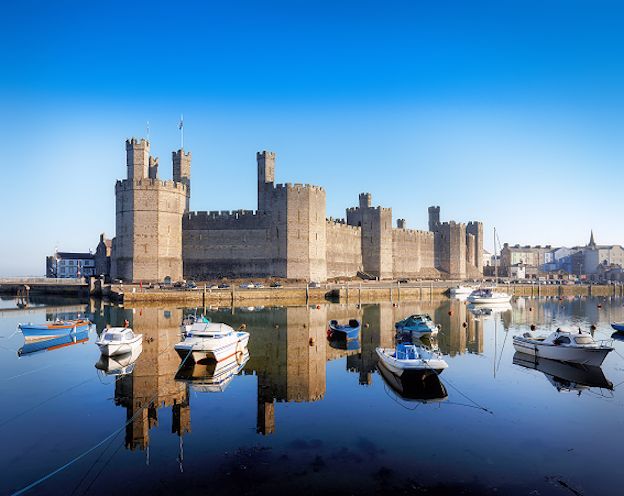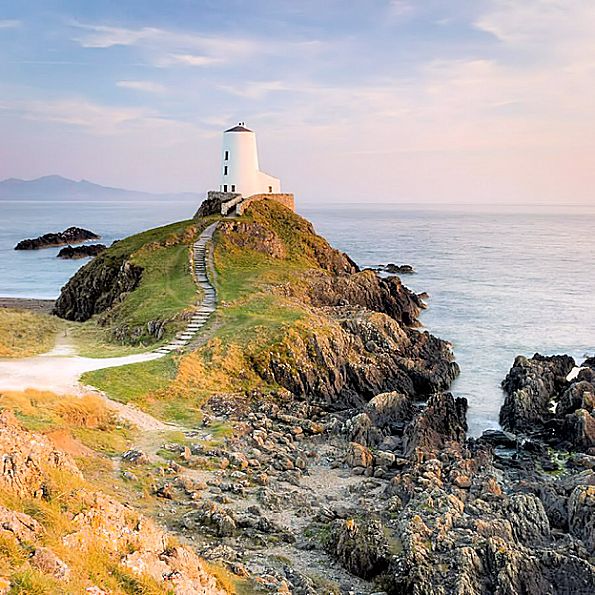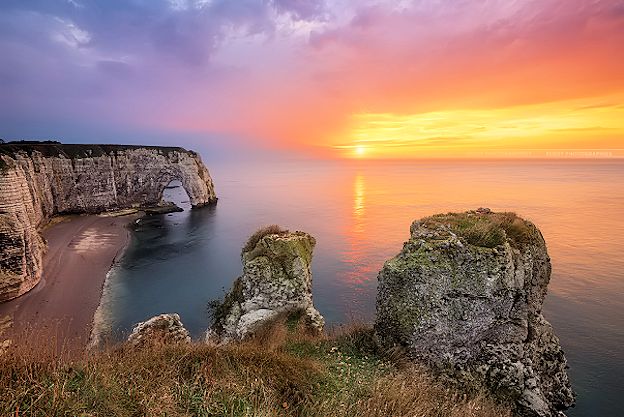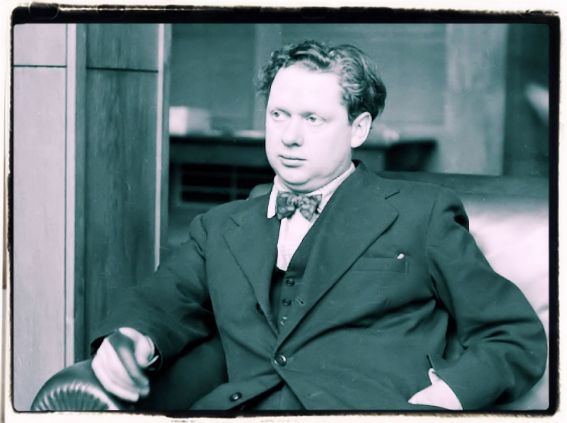
Welsh quotes and literature, some very famous aphorisms and short stories from the Welsh world of literature, folk songs, traditions, and culture from Wales.
Traditional Welsh Folk Song
Down yonder green valley where streamlets meanders When twilight is fading I pensively rove, Or at the bright noontide in solitude wander Amid the dark shades of the lonely ash grove.
`Twas there while the blackbird was cheerfully singing I first met that dear one, the joy of my heart, Around us for gladness the bluebells were springing, Ah then little thought I how soon we should part.
Still glows the bright sunshine o’er valley and mountain, Still warbles the blackbird its note from the tree, Still trembles the moonbeam on streamlet and fountain, But what are the beauties of nature to me?
With sorrow, deep sorrow, my bosom is laden, All day I go mourning in search of my love, Ye echoes, o tell me, where is the sweet maiden? She sleeps ‘neath the green turfs down by the ash grove.
Llwyn On, The Ash Grove Traditional Welsh folk song
Their Lord they will praise. Their speech they will keep. Their land they shall lose. Except for Wild Wales.
Ancient prophecy of the Celtic bard Taliesin
As well as being the largest National Park in Wales, Snowdonia boasts the highest mountain in England and Wales, and the largest natural lake in Wales, as well as a wealth of picturesque villages like Betws y Coed and Beddgelert. Snowdonia is an area steeped in culture and local history, where more than half its population speak Welsh.
Snowdonia National Park
Be honorable with yourself if you wish to associate with honorable people.
Anonymous
Better two heads than one, better one head than a hundred.
Anonymous
He who sows thorns should not go barefooted.
Anonymous
Old age is a hundred disorders
Welsh proverb.
One does not ring a bell for the deaf.
Anonymous

There is no prison like a guilty conscience.
Anonymous
Who complains without cause, let a cause be made for him.
Anonymous
Most Welshmen are worthless, an inferior breed, doctor. He did not know I was Welsh. Then he praised the architects of the German death – camps – did not know I was a Jew.
Dannie Abse (1923 – ) Welsh poet and physician.
An impotent people, Sick with inbreeding, Worrying the carcase of an old song.
R. S. Thomas (1913 – 2000) Welsh poet and clergyman.
An old and haughty Nation proud in Arms.
John Milton (1608 – 1674)
At Holly Well they speake Welsh, the inhabitants go barefoote and bare leg’d a nasty sort of people, their meate is very small here, the mutton is noe bigger than little lamb, and what of it is very sweet.
Celia Fiennes (1662 – 1741)
First God made England, Ireland, and Scotland. That’s when he corrected his mistakes and made Wales.
Katharine Hepburn (1907 – 2003)
How sad it is that a Welshman should be an exile in Wales, for every Welshman living in Cardiff or its suburbs is in exile.
W. J. Gruffydd (1881 – 1954)
If you want to see Wales, Measure the long isosceles Of Snowdon with your feet.
Raymond Garlick (Referring to climbing Mount Snowdon, northwest Wales, the highest point of which is 1085 metres (3560 ft) above sea level.
Directions for Visitors, “The Welsh-Speaking Sea”)
It was so dismal and gloomy on these mountains, and so were my spirits. I felt as though we were wandering under the sea, and ought to climb over these basalt blocks and porphyry rocks to the surface and light of day.
Julius Rodenberg (1831 – 1914)
Referring to his only experience of mountain-walking in North Wales, which took place in dense mist.
An Autumn in Wales, “Caernarvon and Llanberis” (William Linnard (tr.))
Put the car away; when life fails, What’s the good of going to Wales?
W. H. Auden (1907 – 1973) British poet.
The first night of my second voyage to Wales, Tired as a rag from ascending the left cheek of earth, I nevertheless went to Merthyr in good company.
Les Murray (Australian poet)
The thing I value about Wales and Welsh background is that it has always been a genuinely more classless society than many people present England as being.
Geoffrey Howe (British politician)

‘The Welsh,’ said the Doctor, ‘are the only nation in the world that has produced no graphic or plastic art, no architecture, no drama. They just sing,’ he said with disgust, ‘sing and blow down wind instruments of plated silver.’
Evelyn Waugh (1903 – 1966)
There are still parts of Wales where the only concession to gaiety is a striped shroud.
Gwyn Thomas (1913 – 1981)
This Caru-ar-y-gwely, called courting on the bed, is customary throughout Wales—the girl sits on the bed chatting with her beloved until morning.
Julius Rodenberg (1831 – 1914)
To live in Wales is to be conscious At dusk of the spilled blood That went to the making of the wild sky.
R. S. Thomas (1913 – 2000)
Wales, which I have never seen, Is gloomy, mountainous, and green, And, as I judge from reading Borrow, The people there rejoice in sorrow.
Rolfe Humphries (1894 – 1969)
We can trace almost all the disasters of English history to the influence of Wales.
Evelyn Waugh (1903 – 1966)
British novelist.
A Welchman on a tyme went to churche to be shryved…one of his felowes askyd hym whether he had seen God Almighty to day; which answered and sayd: nay, but I saw one forty shillings better.
Anonymous
Eddy was a tremendously tolerant person, but he wouldn’t put up with the Welsh. He always said, surely there’s enough English to go round.
John Mortimer
It is because of their sins, and more particularly the wicked and detestable vice of homosexuality, that the Welsh were punished by God and so lost first Troy and then Britain.
Gerald of Wales
Referring to the belief that the Welsh were orginally refugees from the civilization of Troy and subsequently dominant among the ancient Britons.
The Journey Through Wales; and, the Description of Wales, “The Description of Wales” (T. D. Lewis and W. Thorpe (trs.))
It strikes us as rather a pity that a civilized language should have been allowed to mar the complete Cambrianism of the proceedings.
Anonymous
On being desired to ask three things, which he would have granted, hee askt, 1st, as much ale as would serve him all his life; then what hee would have in the second place, as much tobacco as would serve his life; then, what in the third place, he stood awhile: the king prest him to speak quickly: he then said, more ale!
John Skelton
A Welshman responding to the king’s offer to grant three requests.
Others, who have not, as a rule, gone the length of visiting the persons they condemn, call the Welshmen thieving, lying, religious, and rebellious knaves.
Edward Thomas (1878 – 1917)

Saynte Peter wente out of Heven gates and cryed wyth a loud voyce Cause bobe, that is as moche to saye as rosted chese, which thynge the Welchemen herynge, ranne out of Heven a great pace.
Anonymous (Describing Saint Peter’s method of getting the Welsh, proverbially fond of cheese, out of heaven, following God’s expression of weariness with their conversation.)
Sewn on, so to speak, like a patch of different material to England’s robe of state, Wales nevertheless has succeeded in retaining its own texture and colour.
Rhys Davies (1903 – 1978)
So much beauty, and so much native good-breeding and refinement, I do not remember to have seen before or since in any cottage.
Thomas De Quincey (1785 – 1859)
The devotion of the Welsh to their land is proverbial, and homesickness is much the best-publicized of their national emotions – hiraeth, that sense of longing which has been sentimentalized in so many treacly songs.
Jan Morris (British travel writer)
The English are striving for power, the Welsh for freedom; the English are fighting for national gain, the Welsh to avoid a disaster.
Gerald of Wales
The Welsh are all actors. It’s only the bad ones who become professionals.
Richard Burton (1925 – 1984)
The Welsh peasants have the reputation… of being singularly false and never speaking their minds…If this be true, they are worthy descendants of their countrymen of old, who betrayed their chiefs, and those chiefs each other.
Louisa Costello (1799 – 1870)
The Welsh people possess that surest of all retreats from the outsider, their own language.
H. V. Morton (1892 – 1979)
They practice magic out of season, they hate the English with good reason, Nor do they trust the Irish more, And find the Scots an utter bore.
Rolfe Humphries (1894 – 1969)
To hear a poor and grimy Welshman, who looks as though he might not have a thought above bread and beer, talk about the poets and poetry of his native land, ancient and modern, is an experience which…gives a stranger quite a shock.
Wirt Sykes
Torn, with torn satchel, reared in grit and filth, His misery shows a town taken by stealth, And all the accusing heavens in that Welsh face.
Vernon Watkins (1906 – 1967)
Was he a malignant creature whose perverted sense of humour delighted to send travellers astray? Was he merely half-witted? Probably not: the Welsh are quite incapable of directing one anywhere.
John Moore (1907 – 1967)
Referring to getting lost after consulting a man outside Llangurig, Wales.
Tramping Through Wales, “Adventures in the South”

The land of my fathers. My fathers can have it.
Dylan Thomas (1914 – 1953)
Sheep speckle the mountainside, revolving their jaws with empty eyes, horses dance in the warm rain.
Allen Ginsberg (1926 – 1997)
From the ancient book of Welsh mythology, The Mobinogion, comes the unusual name “Dylan” which, appropriately, was given to a 20th century bard who wrote in English, and is generally considered Wales’ greatest poet. Dylan Thomas.
Dylan Thomas was born in Swansea, in South Wales, in 1914, and wrote much of his finest poetry at an early age. He also wrote prose and short stories, and one of his best loved works is based on his own childhood in Swansea, in which he captures the humour and the colourful speech of the Welsh: A Child’s Christmas in Wales.
It was on the afternoon of the day of Christmas Eve, and I was in Mrs Prothero’s garden, waiting for cats, with her son Jim. It was snowing. It was always snowing at Christmas. December, in my memory, is white as Lapland, though there were no reindeers. But there were cats. Patient., cold and callous our hands wrapped in socks, we waited to snowball the cats. Sleek and long as jaguars and terrible-whiskered, spitting and snarling, they would slink and sidle over the white back-garden walls, and the lynx-eyed hunters, Jim and I, fur-capped and moccasined trappers from Hudsons Bay, off Eversley Road. would hurl our deadly snowballs at the green of their eyes.
The wise cats never appeared. We were so still. Eskimo-footed arctic marksmen in the muffling silence of the eternal snows – eternal, ever since Wednesday – that we never heard Mrs Prothero’s first cry from her igloo at the bottom of the garden. Or, if we heard it at all, it was to us like the far-off challenge of our enemy and prey, the neighbour’s polar cat. But soon the voice grew louder. “Fire!” cried Mrs Prothero, and she beat the dinner-gong.
And we ran down the garden. with the snowballs in our arms. towards the house: and smoke, indeed, was pouring out of the dining-room, and the gong was bombilating and Mrs Prothero was announcing ruin like a town crier in Pompeii. This was better than all the cats in Wales standing on the wall in a row. We bounded into the house, laden with snowballs, and stopped at the open door of the smoke-filled room. Something was burning all right; perhaps it was Mr Prothero, who always slept there after midday dinner with a newspaper over his face. But he was standing in the middle of the room, saying, “A fine Christmas! and smacking at the smoke with a slipper. “Call the fire brigade.” cried Mrs Prothero as she beat the gong. “They won’t be there,” said Mr Prothero, “it’s Christmas.” There was no fire to be seen, only clouds of smoke and Mr Prothero standing in the middle of them, waving his slipper as though he were conducting. “Do something,” he said. And we threw all our snowballs into the smoke – I think we missed Mr Prothero – and ran out of the house to the telephone box. “Let’s call the police as well.” Jim said. “And the ambulance.” “And Ernie Jenkins. he likes fires.” But we only called the fire brigade. and soon the fire engine came and three tall men in helmets brought a hose into the house and Mr Prothero got out just in time before they turned it on. Nobody could have had a noisier Christmas Eve. And when the firemen turned off the hose and were standing in the Wet and smoky room.
Jim’s aunt, Miss Prothero, came downstairs and peered in at them. Jim and I waited, very quietly, to hear what she would say to them. She said the right thing, always. She looked at the three tall firemen in their shining helmets, standing among the smoke and cinders and dissolving snowballs, and she said: ” Er… would you like something to read?”.
From a Child’s Christmas in Wales by Dylan Thomas
Find out more reading the following articles:

